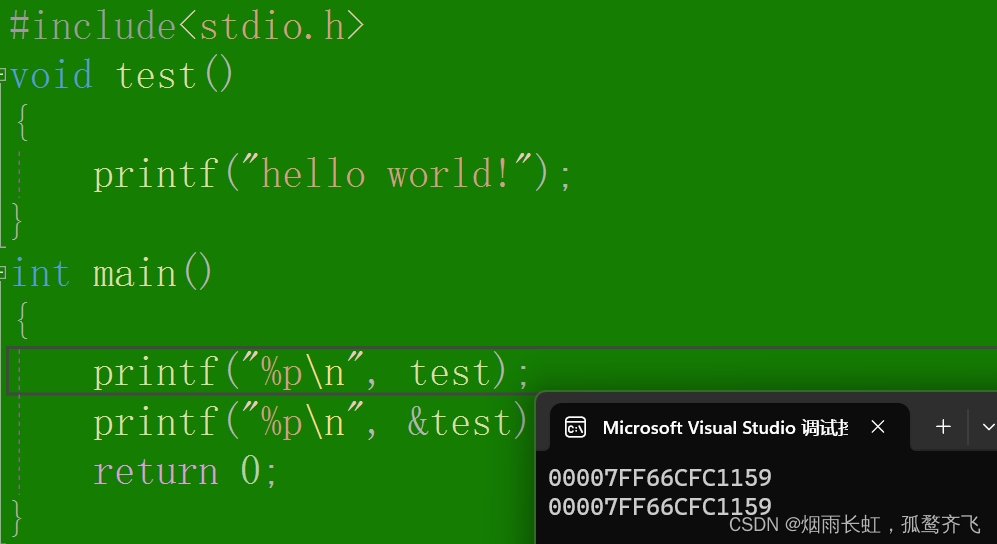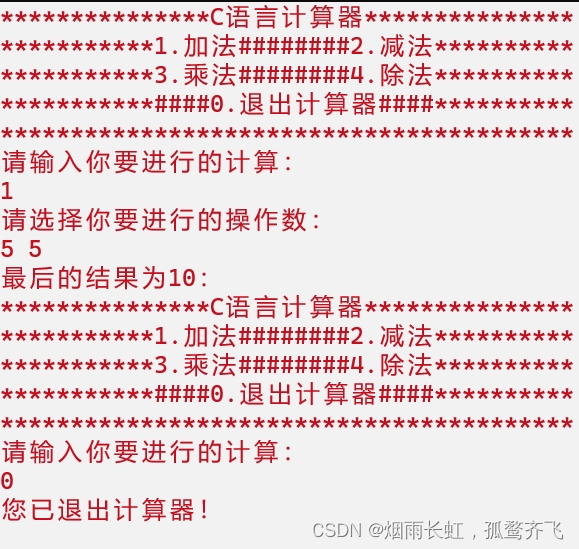--------------------------------------------------
-----------------------------------
-------------------------
-----------------
----------
--------
-----
---
Table of contents
Simulate calculator using C language
function pointer variable
1. Function pointers are used to store function addresses . The purpose is to directly pass addresses Call function.
2.The function name is the function's address. (We can use the following code to demonstrate)
#include<stdio.h>
void test()
{
printf("hello world!");
}
int main()
{
printf("%p\n", test);
printf("%p\n", &test);
return 0;
}
We foundThe function name is the address of the function
function pointer type
int (*test)(int x,int y)
| | |
| | |
| | |
| | |test指向函数的参数类型和个数的交代
| |函数指针变量名
|test指向函数的返回类型
int(*)(int x,int y)-test指向的指针变量的类型
x和y写和省略都是可以的Call the function pointed to by the function pointer(Find the sum of two numbers ):
#include<stdio.h>
int QiuHe(int x, int y)
{
return x + y;
}
int main()
{
int a = 0, b = 0;
int(*test)(int, int) = QiuHe;
printf("请输入两个你喜欢的整数:\n");
scanf_s("%d%d", &a, &b);
printf("求和结果是:%d\n", (*test)(a, b));
//因为函数名就是函数地址,所以可以这么写
//printf("求和结果是:%d\n", test(a, b));
return 0;
}
Array of function pointers
1. Definition: We mentioned before that a pointer array is a storage space for a pointer type variable, and our function pointer array stores the address of the function in an array< /span>.
int (*test[])()Because[ ] has a higher priority than *,
Sotest is first combined with [ ] indicating that test is an array,
When test[ ] is combined with int(*)() type, it becomes function pointer array< /span>.
Usage scenarios of function pointer array:
Simulate calculator using C language
1. The following is our traditional function call simulation calculator algorithm. There aremany repetitive codes written and time The complexity is high, and the codeis not efficient.
#include<stdio.h>
#include <windows.h>
int JiaFa(int x, int y)
{
return x + y;
}
int JianFa(int x, int y)
{
return x - y;
}
int ChenFa(int x, int y)
{
return x * y;
}
int ChuFa(int x, int y)
{
return x / y;
}
void menu()
{
system("color F4");
printf("***************C语言计算器***************\n");
printf("***********1.加法########2.减法**********\n");
printf("***********3.乘法########4.除法**********\n");
printf("***********####0.退出计算器####**********\n");
printf("*****************************************\n");
}
int main()
{
int a = 0, b = 0, input = 0, sum = 0;
do
{
menu();
printf("请输入你要进行的计算:\n");
scanf_s("%d",&input);
switch (input)
{
case 0:
printf("您已退出计算器!\n");
break;
case 1:
printf("请选择你要进行的操作数:\n");
scanf_s("%d%d", &a, &b);
sum = JiaFa(a, b);
printf("最后的结果为%d:\n", sum);
break;
case 2:
printf("请选择你要进行的操作数:\n");
scanf_s("%d%d", &a, &b);
sum = JianFa(a, b);
printf("最后的结果为%d:\n", sum);
break;
case 3:
printf("请选择你要进行的操作数:\n");
scanf_s("%d%d", &a, &b);
sum = ChenFa(a, b);
printf("最后的结果为%d:\n", sum);
break;
case 4:
printf("请选择你要进行的操作数:\n");
scanf_s("%d%d", &a, &b);
sum = ChuFa(a, b);
printf("最后的结果为%d:\n", sum);
break;
default:
printf("输入错误,重新输入!\n");
break;
}
} while (input);
return 0;
}
Implementation of function pointer array:
This greatly improves the efficiency of program operation
#include<stdio.h>
#include <windows.h>
int JiaFa(int x, int y)
{
return x + y;
}
int JianFa(int x, int y)
{
return x - y;
}
int ChenFa(int x, int y)
{
return x * y;
}
int ChuFa(int x, int y)
{
return x / y;
}
void menu()
{
system("color F4");
printf("***************C语言计算器***************\n");
printf("***********1.加法########2.减法**********\n");
printf("***********3.乘法########4.除法**********\n");
printf("***********####0.退出计算器####**********\n");
printf("*****************************************\n");
}
int main()
{
int a = 0, b = 0, input = 0, sum = 0;
int(*p[5])(int, int) = { NULL,JiaFa,JianFa,ChenFa,ChuFa };
//设置成五个元素的数组 0 1 2 3 4
do
{
menu();
printf("请输入你要进行的计算:\n");
scanf_s("%d", &input);
if (1 <= input && input <= 4)
{
printf("请输入两个操作数:\n");
scanf_s("%d%d", &a, &b);
sum = (*p[input])(a, b);
printf("最后的结果是:%d\n", sum);
}
else if (input == 0)
{
printf("您已退出计算机!\n");
}
else
{
printf("输入错误,重新输入!\n");
}
} while (input);
return 0;
}You can also use the function pointer method to function-encapsulate the contents of the switch, and then use the function pointer to call the calculation function.
#include<stdio.h>
#include <windows.h>
int JiaFa(int x, int y)
{
return x + y;
}
int JianFa(int x, int y)
{
return x - y;
}
int ChenFa(int x, int y)
{
return x * y;
}
int ChuFa(int x, int y)
{
return x / y;
}
void menu()
{
system("color F4");
printf("***************C语言计算器***************\n");
printf("***********1.加法########2.减法**********\n");
printf("***********3.乘法########4.除法**********\n");
printf("***********####0.退出计算器####**********\n");
printf("*****************************************\n");
}
void ZhuanYi(int (*p)(int,int))
{
int a = 0, b = 0, sum = 0;
printf("请输入两个操作数:\n");
scanf_s("%d%d", &a, &b);
sum = p(a, b);
printf("最后的结果是:%d\n", sum);
}
int main()
{
int input = 0;
do
{
menu();
printf("请输入你要进行的计算:\n");
scanf_s("%d", &input);
switch (input)
{
case 0:
printf("您已退出计算器!\n");
break;
case 1:
ZhuanYi(JiaFa);
break;
case 2:
ZhuanYi(JianFa);
break;
case 3:
ZhuanYi(ChenFa);
break;
case 4:
ZhuanYi(ChuFa);
break;
default:
printf("输入错误,重新输入!\n");
break;
}
} while (input);
return 0;
}----------------------------------------
-----------------------
-------------
---------
------
